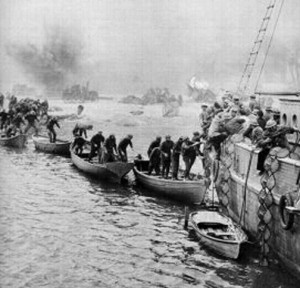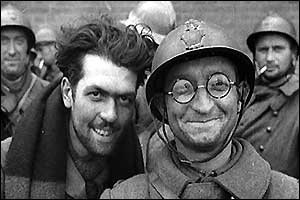The French had collapsed. The Dutch had been overwhelmed. The Belgians had surrendered. The British army, trapped, fought and fell back toward the Channel ports, converging on a little fishing village whose name was then spelled Dunkerque.
Behind them lay the sea.
It was England’s greatest crisis since the Norman conquest, vaster than those precipitated by Philip II’s Spanish Armada, Louis the XIV’s triumphant armies, or Napoleon’s invasion barges. This time Britain stood alone. If the Germans crossed the Channel and established uncontested beachheads, all would be lost, for it is a peculiarity of England’s island that its southern region is indefensible against disciplined troops. . . .
Now the 220,000 Tommies at Dunkirk, Britain’s only hope, seemed doomed. On the Flanders beaches they stood around like souls in purgatory, awaiting disposition. There appeared to be no way to bring more than a handful of them home. The Royal Navy’s vessels were inadequate. King George VI had been told they would be lucky to save 17,000. The House of Commons was warned to prepare for “hard and heavy tidings.”
Then, from the streams and estuaries of Kent and Dover, a strange fleet appeared: trawlers and tugs, scows and fishing sloops, lifeboats and pleasure craft, smacks and coasters, the island ferry Gracie Fields; Tom Sopwith’s America’s cup challenger Endeavor; even the London fire brigade’s fire-float Massey Shaw–all of them manned by civilian volunteers: English fathers, sailing to rescue England’s exhausted and bleeding sons . . .
Thus begins the first volume of William Manchester’s biography of Winston Churchill, The Last Lion. This opening (which goes on for another page and a half) is my favorite of any book––fiction or non-fiction––I’ve ever read. The full three-volume biography, finished by a friend after Manchester’s untimely death, is an uncontested masterpiece of the genre.
And the “Dunkirk miracle” is a historical masterpiece of human grit on a grand and inspiring scale.
It was on this very day, May 26, 1940, that the evacuation began. When it ended on June 4, this citizen’s armada had not only rescued British soldiers, but French support troops as well: a total of 338,000 men!
I’ll tell you the truth, no matter how many times I read Manchester’s opening account, I cannot help tearing up. English fathers, sailing to rescue England’s exhausted and bleeding sons. The courage, the devotion, the duty. If you want to know what it all felt like, I urge you to watch William Wyler’s classic, Mrs. Miniver. In fact, please watch it with your sons and daughters, and talk to them afterward about what that world was like––when neighbor and village and town and country came together for common cause. Teach your children that there is such a thing as right, and good, and truth—and that fighting for those things is a worthy enterprise.
Then talk about sacrifice. Sacrifice is the most humanizing of our actions, for we must fight against our instinct for self-preservation to do it. Yet in such action we become more than the dust of the earth. Our search for meaning gains a foothold and we step upward toward “the better angels of our nature.”
It is no mystery, then, that some of the most enduring stories are about sacrifice. From “the greatest story ever told” to Casablanca. From Samson to Gran Torino. From The Lord of the Rings to Stella Dallas. On and on we go, because the power of sacrifice resonates in the deepest part of us, which also happens to be the part that makes us great.
And when it occurs in real life, as it did 73 years ago, it is transformational. As long as we remember it.
Which is why, on this Memorial Day weekend, I choose to remember our allies, the heroes of Dunkirk. May they rest in peace.


